Thomas Jefferson Presidency- Major Events

Thomas Jefferson Presidency- Major Events

The History Surrounding Thomas Jefferson Presidency- Major Events!
The 1800 election between Aaron Burr and Thomas Jefferson was extremely close. Both received the same number of electoral votes, 73, and were tied for the presidency. The House of Representatives was asked to break the stalemate. Finally, on the 36th ballot, on February 17, the opposition crumbled and Jefferson was elected. Jefferson’s election was one of his most significant political victories, confirming his belief that “the sovereign people” would repel attacks on their liberties and the republican principles of 1776.
also read: NYU Acceptance rate and Admissions
Thomas Jefferson served two terms as President. The following major events occurred during his presidency: the Tripolitan War (1801-1805), the establishment of the United States Military Academy (1802), the purchase of Louisiana (1803), the admission of Ohio to the Union (1803), the Lewis Clarke expedition (1804-1806), the abolition of the slave trade (1807), the Chesapake affair, and the Embargo Act (1807-1809).
War of Tripoli (1801-1805):
During Jefferson’s presidency, the United States was at war with the Barbary state. To protect American ships from pirate attacks, the government used to pay tribute to the pirates of this area. After a while, the pirates requested an increase in tribute, which Jefferson denied. As a result, a war broke out in the Tripoli area. This war lasted approximately five years. The United States won the war and was no longer required to pay tribute. It did, however, continue to pay tribute to the other Barbary States.
Financial Program
Jefferson advocated for the reduction of national debts, the repeal of internal taxes, the reduction of military expenditures, and the establishment of a congressional system of appropriations for specific purposes. Gellatin, his secretary of the Treasury, proposed a financial programme that was diametrically opposed to Hamilton’s programme, namely a weak central government. Congress unanimously supported his programme.
To put it into practise, the majority of the internal excise imposed during Hamilton’s tenure was repealed. To reduce the national debt, customs revenue was increased while military spending was reduced. As a result, the federal government’s national debt fell from 83 million to 53 million dollars in eight years. However, the reduction in military budget proved to be a poor decision in the Tripolitin war and the War of 1812.
Purchase of Louisiana
The Louisiana Purchase is regarded as Thomas Jefferson’s most significant achievement during his presidency, as it nearly doubled the size of the United States. Jefferson was eager to purchase this province from France because it would eliminate the possibility of war with France. With this in mind, he dispatched Robert R. Lavingstone to France, and on April 30, 1803 France sold 828,000 square miles of land for 15 million dollars (approximately 283 million dollars in today’s money), i.e. five cents per acre.
With the acquisition of Louisiana, the United States gained control of the entire Mississippi Valley, including waterways. It opened up a vast region that now includes 15 states. Kansas, Nebraska, Oklahoma, Texas, North and South Dakota, New Mexico, and others are among them.it paved the way for westward expansion and opened up a vast area of natural resources as well. Prof. Elson describes the purchase of Louisiana as “the greatest diplomatic achievement in the annals of United States.”
Lewis Clarke Expedition:
Jefferson decided to send an expedition led by Lewis and Clarke to explore the Louisiana territory. The expedition began in 1803 and concluded in 1806. Jefferson obtained $ 25,000/- from Congress to cover the costs of the expedition, which consisted of 40 people in total. The expedition travelled approximately 8,000 miles and collected data on the landscape, plants, animals, resources, minerals, and people of that region (mostly native Americans). The journals of the Lewis and Clarke expedition described 180 plants and 125 animals unknown to scientists at the time. The most significant advantage of this expedition was that the US Government learned exactly what it had purchased.
New National Capital: Washington DC
New York City was the first capital of the United States. When Washington was re-elected in 1792, the capital was relocated to Philadelphia. It was the capital for nearly a decade. In March 1801, Thomas Jefferson, the first American President, was inaugurated in the new and permanent capital of America, Washington D.C.
Slave Trade Abolition:
Jefferson abolished the foreign slave trade on January 1, 1808. He also established Executive privilege as a precedent.
Thomas Jefferson Presidency